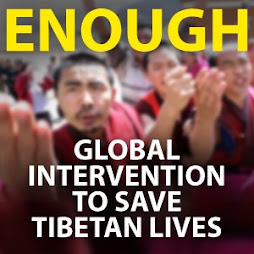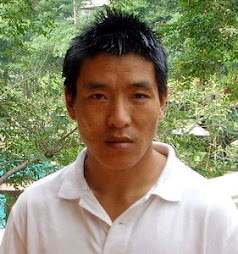As 166 organizações associadas à International Tibet Support Network condenam o governo Chinês pelas execuções de vários Tibetanos; Lobsang Gyaltsen, Loyak, Penkyi e um quarto Tibetano não identificado, em Lhasa no dia 20 de Outubro.
A decisão Chinesa de executar estes Tibetanos é uma afronta ao sistema judicial internacional. Estas execuções têm claramente um motivo político (vide Notas 1 & 2), e são legítimas as preocupações relativamente ao facto dos condenados não terem tido acesso a um julgamento justo.
As execuções de terça-feira mostram que a China usará todos os métodos à sua disposição para intimidar os Tibetanos e esmagar toda e qualquer oposição à sua ocupação do Tibete. Lobsang Gyaltsen e Loyak foram condenados à morte no dia 8 de Abril de 2009. Foram acusados de terem "ateado fogos fatais" devido aos quais, e de acordo com a agência noticiosa Xinhua, sete Chineses faleceram a 14 de Março, quando quatro dias de protestos pacíficos por parte de monges Tibetanos escalaram em protestos nas várias cidades Tibetanas.
A 8 de Abril, Xinhua declarava que os referidos Tibetanos "tinham que ser executados de forma a acalmar a raiva das pessoas." De acordo com os procedimentos judiciais, as sentenças à pena de morte devem ser revistas pelo Tribunal Supremo do Povo antes da sua execução, no entanto não existe informação relativamente ao facto de tais revisões terem ocorrido nos casos acima mencionados.
A identidade dos restantes Tibetanos executados - Penkyi e aparentemente uma quarta pessoa - permance por esclarecer. Três Tibetanos receberam sentenças de morte suspensas no âmbito de acusações de pilhagem em Abril 2009. Gangtu e Tenzin Phuntsog receberam sentenças de morte suspensas por dois anos, no mesmo dia em que Lobsang Gyaltsen e Loyak foram condenados.
Foi ainda emitida uma sentença a Dawa Sangpo. No dia 21 de Abril, Xinhua relatou que três mulheres Tibetanas foram condenadas, tendo sido acusadas de pilhagens que resultaram na morte de seis pessoas. Penkyi de Sakya recebeu uma sentença de morte suspensa por dois anos e outra Penkyi de Nyemo foi condenada a prisão perpétua; Chime Lhamo de Namling foi condenada a dez anos de prisão.
Em resposta às execuções, representantes do movimento Tibetano realizaram as seguintes declarações:
Lhadon Tethong, Directora Executiva de Students for a Free Tibet disse; "Estas execuções, as primeiras execuções de Tibetanos conhecidas desde 2003, são um "travesti" da justiça e assinalam uma escalada alarmante na violenta campanha do governo Chinês visando castigar, intimidar e silenciar os Tibetanos que ousam expressar-se contra o domínio Chinês. Tibetanos e seus apoiantes em todo o mundo irão nos próximos dias manifestar-se nas ruas, com o intuito de condenarem estas execuções e apelarem a uma acção imediata por parte dos nossos governos.
Nós apelamos também ao Presidente Norte-Americano Obama para que condene estas execuções e empreenda uma acção firme e concreta visando o fim da ocupação Chinesa do Tibete, quando realizar a sua primeira visita à China no próximo mês."
Paul Bourke do Australia Tibet Council disse; "Estas execuções brutais simbolizam a intenção Chinesa de reforçar o controlo político no Tibete, ao invés de serem o resultado da justiça. As execuções visam enviar um forte aviso aos Tibetanos - qualquer exibição pública de descontentamento relativamente ao domínio Chinês sobre o Tibete será correspondido da forma mais dura possível. Tendo em conta estas notícias tremendas, é mais do que imperativo que o Primeiro Ministro Rudd se encontre com o Dalai Lama em Dezembro, com o intuito de discutirem acerca de uma acção construtiva a ser tomada pelo governo Australiano e visando uma resolução justa para o povo Tibetano.
Dhardon Sharling da Tibetan Women's Association disse; "Os membros da International Tibet Support Network sinceramente esperam que os governos em todo o mundo se juntem a nós na condenação das execuções de terça-feira. A questão Tibetana, e os associados abusos de direitos humanos e repressão brutal inflingidos pelo governo Chinês não desaparecerão enquanto não ocorrer uma resolução política viável e concreta, relativamente aos 60 anos da ocupação do Tibete. No entanto as autoridades Chinesas rejeitaram com desdém as iniciativas de Sua Santidade visando uma solução mutualmente benéfica tanto para a China como para o Tibete. Apelamos à comunidade internacioanl que fortemente interceda junto das autoridades Chinesas, para que negoceiem uma solução pacífica para esta injustiça a longo-prazo.
Stephanie Brigden do Free Tibet acrescentou; "As execuções de terça-feira são uma afronta. Apesar da lei Chinesa conter providências segundo as quais estes casos deveriam ser julgados num tribunal aberto - onde observadores independentes podem estar presentes - estes quatro Tibetanos foram condenados dentro de portas fechadas. É impossível ter alguma espécie de confiança no facto das mais básicas salva guardas legais terem sido tomadas. Em Dezembro do ano passado as NU confirmaram que o uso da força, obtido através da tortura e com o intuito de assegurar condenações é uma rotina comum na China - oficiais chineses reconheram inclusivamente que "quase todas as condenações recentes se baseam em interrogaçoes ilegais."
As organizações associadas à International Tibet Support Network, coalição global de grupos de apoio ao Tibete, solicitam que a China:
* De imediato páre com acrescidas execuções de Tibetanos e comute quaisquer outras sentenças de morte existentes;
* Publique os nomes, com referência ao paradeiro, dos mais de 1,200 Tibetanos desaparecidos desde os protestos de Março/ Abril 2008;
* Aceda ao pedido realizado em Novembro 2008 pela Comissão Contra a Tortura das NU e visando "um inquérito independente e completo sobre o excessivo uso de força, incluíndo o seu uso sobre manifestantes pacíficos."
* Aceite as iniciativas desenvolvidas pelo Dalai Lama e negoceie uma resolução pacífica, relativamente aos 60 anos de ocupação do Tibete.
As 166 associações da International Tibet Support Network apelam a todos os governos que condenem estas execuções e que sejam obtidas garantias por parte da China de que todos os julgamentos de Tibetanos terão lugar num tribunal aberto, que os acusados terão direito a representantes legais, que as salvaguardas legais sejam respeitadas, e que a presença de staff consular assim como jornalistas estrangeiros seja permitida, quando solicitada.
A International Tibet Support Network
(vide nota 3 para uma lista completa de organizações associadas)
Notas:
1. Um relatório da Human RIghts Watch de March 2009 revelou um sistema judicial tão politizado que qualquer possibilidade de um julgamento justo para os Tibetabnos, está por completo afastada. O relatório concluiu que o "princípio da independência do judicial se encontra minado por parte da exigente liderança Chinesa que pretende uma submissão da polícia e dos tribunais ao requerimentos políticos." Por exemplo, a 19 de Março 2008, antes mesmo de qualquer decisão por parte de um tribunal, a procuradoria de Lhasa "foi organizada, planeada e premeditada pela clique do Dalai Lama," e nos casos de 24 suspeitos criminais formalmente detidos nesse dia " os crimes eram óbvios e as evidências suficientes" para determnar que haviam cometido "crimes de segurança de estado."
http://www.hrw.org/en/news/2009/03/09/china-hundreds-tibetan-detainees-and-prisoners-unaccounted
2. Durante uma reunião intitulada “Working Commission to adjudicate cases involving 14 March Riot,” convocada pelo Alto Tribunal do Povo da Região Autónoma Tibetana (RAT) a 2 Abril 2008, Pema Trinley, Vice Governador Executivo da RAT apelou a que o sistema judiciário agisse com rapidez e esmagasse a "clique do Dalai." Afirmou que uma forte acção legal deveria ser realizada juntamente com a política do partido e de forma a que o veredicto final ganhasse dividendos políticos, legais e sociais, quando se referia a atingir a estabilidade política e social. Fonte: Centro Tibetanos para os Direitros humanoa e Democracia
Os 166 membros dathe International Tibet Support Network são:
América do Norte:
Association Cognizance Tibet, North CarolinaBay Area Friends of TibetBoston Tibet NetworkCanada Tibet CommitteeChina Tibet InitiativeColorado Friends of TibetCommittee of 100 for TibetDhokam Chushi GangdrukInternational Campaign for TibetInternational Tibet Independence MovementLos Angeles Friends of TibetMonadnock Friends of TibetNorthwest Tibetan Cultural AssociationRangzen AllianceSan Diego Friends of TibetSanta Barbara Friends of TibetSeattle Friends of TibetSierra Friends of TibetStudents for a Free TibetStudents for a Free Tibet – CanadaThe Tibetan Alliance of ChicagoThe World Tibet Day FoundationTibet Committee of FairbanksTibet Justice CenterTibetan Association of IthacaTibetan Association of Northern CaliforniaTibetan Association of Santa FeTibetan Association of South CaliforniaTibetan Cultural Association - QuebecTIBETmichiganToronto Tibet Youth CongressU.S. Tibet CommitteeWestern Colorado Friends of Tibet
América Central & e América do Sul:
Amigos del Tibet, El SalvadorAsociacion Cultural Peruano TibetanaCasa Tibet MexicoGrupo De Apoyo a Tibet ChileGrupo Pro-Cultura Tibetana, ChileCentro De Cultura TibetanaLe Club FrancaisPensando En Tibet - MexicoTibet Group-PanamaTíbet Patria Libre, Uruguay
Ásia:
Bharrat Tibbat Sahyog Manch, IndiaCircle of Friends (Philippines)Core Group for Tibetan Cause, IndiaFoundation for Universal Responsibility of H. H. the Dalai LamaFriedrich-Naumann FoundationGannasamannayGu-Chu-Sum Movement of TibetHimalayan Committee for Action on TibetIndia Tibet Friendship SocietyLung-taMahatma Gandhi Tibet Freedom MovementNational Campaign for Tibetan Support, IndiaNational Democratic Party of TibetRaise Tibetan Flag CampaignRoof of the World Foundation, IndonesiaSFT-IndiaTaiwan Friends of TibetTaiwan Tibet Exchange FoundationThe Youth Liberation Front of Tibet, Mongolia and TurkestanTibet Lives, IndiaTibet Solidarity Forum, BangladeshTibet Support Group Kiku, JapanTibet Support Network JapanTibetan Parliamentary and Policy Research CentreTibetan Women's Association (Central)Tibetan Youth CongressSFT JapanStudents for a Free Tibet - Bangladesh
Australasia:
Australia Tibet CouncilFriends of Tibet New ZealandStudents for a Free Tibet New ZealandTibetan Community of Australia (Victoria)Tibet Action Group of Western
Australia Africa & the Middle East:
Friends of Tibet - Isamailia (Egypt)Israeli Friends of the Tibetan PeopleSouth African Friends of TibetTibet Support Group Kenya
Europa Ocidental:
Aide aux Refugies TibetainsAssociation DorjeAssociation Drôme Ardèche-TibetAssociation of Tibetans in GermanyAssociation Rencontres Tibetaines - C.S.P.T. Midi-PyreneesAssociazione Italia-TibetAustrian Committee for TibetBriancon05 Urgence TibetCaisse d'Aide aux Prisonniers TibetainsCasa del Tibet - SpainComite de Apoyo al Tibet (Madrid)Comite de Soutien au Peuple Tibetain - BretagneComite de Soutien au Peuple Tibetain (Les Lilas)Comite de Soutien au Peuple Tibetain (Switzerland)Comite de Soutien au Peuple Tibetain de l'HeraultEco-Tibet FranceEcoTibet IrelandFrance-TibetFree Tibet CampaignGames of Beijing, SwitzerlandSwiss Tibetan Friendship AssociationGroupe Non-Violent Louis Lecoin, FranceGrupo de Apoio ao Tibete, PortugalInternational Campaign for Tibet DeutschlandInternational Campaign for Tibet EuropeInternational Society of Human Rights, Munich ChapterISCOS-CISL Jamtse Thundel AssociationLa Porte du Tibet, GenevaLes Amis du Tibet - BelgiumLes Amis du Tibet LuxembourgLions Des NeigesLions Des Neiges Mont Blance, FranceMaison des HimalayasMaison du Tibet - Tibet Info Nos Amis de l'HimalayaNice Tibet, FranceObjectif TibetPasseport TibetainReseau International des Femmes pour le TibetSave Tibet, AustriaSociety for Threatened Peoples International (Associate Member)Solidarite TibetStudents for a Free Tibet - FranceStudents for a Free Tibet - UKTibet 59 / 62 Tibet DemocratieTibet Initiative DeutschlandTibet Libertes, France Tibet Society, U.K.Tibet Support Group - IrelandTibet Support Group - NetherlandsTibet Unterstutzung LiechtensteinTibetan Community AustriaTibetan Community in BritainTibetan Community in IrelandTibetan Youth Association in EuropeTibetan Youth UKTibetisches Zentrum HamburgTSG Free Tibet And YouTsowa-Maintenir la Vie, France Urgence TibetVrienden Van TibetEuropa do Norte:Association of Free Tibet Friends of Tibet in FinlandSwedish Tibet CommitteeThe Norwegian Tibet CommitteeTibet Support Committee Denmark -Tibetan Community in Denmark Tibetan Community Sweden
Europa Central e Oriental:
TSG - Slovenia Friends of Tibet Society St. Petersburg, RussiaHelsinki Foundation for Human Rights - Tibet Desk Lithuanian Tibet Culture FoundationPolish Movement for a Free TibetSociety for Croatia-Tibet FriendshipStudents for a Free Tibet, PolandThe Foundation for Civil Society, Russia Tibet cesky (Tibet in Czech)Tibet Support Association - HungaryTibet Support Group - Krasnodar Region, RussiaTibet Support Group - RomaniaTibet Support Group - Sochi Region, RussiaTibetan Programme of The Other Space FoundationUnion Latvija Tibetai (Latvia for Tibet )Zida Cels, Latvia



















